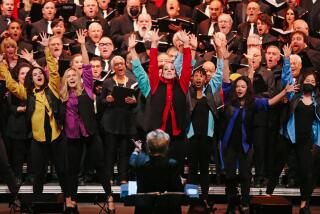Stylish Handel Masque by Musica Angelica
- Share via
Handel’s “Acis and Galatea” is not your usual shepherd-meets-nymph masque. Then again, these days it’s just about the only one going.
Multiple levels of retrospection opened Saturday and Sunday when the local period-instrument band Musica Angelica and soloists revisited that endlessly lyrical English baroque treatment of the classical Greco-Roman myth as the final concert of the summer’s “Ancient Echoes” series outdoors at the Getty Museum.
Saturday the musical reconstruction of Handel’s original 1718 version seemed to go fine, the anomaly of disconcerting amplification notwithstanding. Necessary pauses for retuning and delays as Michael Eagan switched back and forth from playing an archlute to conducting impeded the dramatic flow at times in the more dynamic second act, but otherwise this was a spirited production of stylish character and conviction.
As the titular lovers, soprano Jennifer Ellis and tenor Daniel Plaster sang appealingly in duet. Individually, Ellis was much more free vocally, and more convincing in joy than in grief. The much-admired Plaster appeared to be in uncomfortable voice, sounding tight and uneven at times in the upper register, and more effective in bluster than in ardor.
As is often the case, the bad guy gets the best music, and bass Robert Stafford was an uncommonly suave Polyphemus, the Cyclops who squashes hapless Acis. Stafford’s burnished, baritonal voice faded only on the lowest notes and he avoided the oafish caricature that frequently besets this famous musical portrayal.
He was able to do this in part because tenor Scott Whitaker turned the blandly impartial buttinsky Damon into the center of comic relief, making the most of the limited acting in this concert production. Whitaker also sang cleanly and sweetly, made every syllable clear, and embellished his music effectively.
The four principals, plus countertenor Dana Marsh, doubled as the chorus with elegant and moving ensemble work. In a significant step on his road to the English oratorio, Handel gave the chorus here a dramatically important role and music to match, sophisticated in texture and big in emotion and scope.
Handel also worked economical wonders with his small orchestra, and Musica Angelica played with pointed animation and grace behind the singers. In his role as conductor, Eagan mostly merely emphasized the strong beats of the meter, but that sufficed to hold together the nicely detailed and motivated performances.
More to Read
The biggest entertainment stories
Get our big stories about Hollywood, film, television, music, arts, culture and more right in your inbox as soon as they publish.
You may occasionally receive promotional content from the Los Angeles Times.










